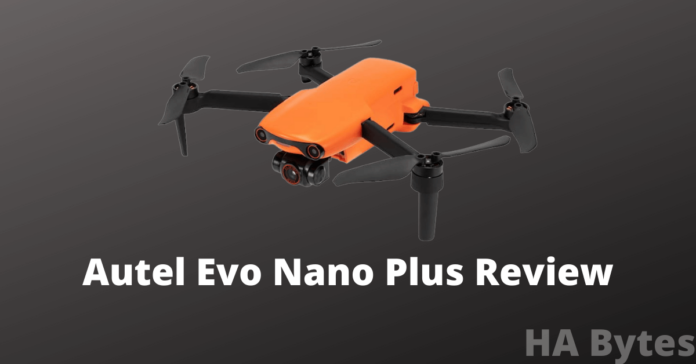Overview:
The Autel Evo Nano Plus is one of the best small drones on the market. It’s incredibly easy to fly, takes amazing 4K video and photos, and is extremely portable, making it the perfect drone for travel. Other than that, the Autel Evo Nano+ is an excellent drone for anyone looking for a pocket-sized model that performs exceptionally well.
- Capture stunning photos and videos with ease
- Feel safe to operate
- Professional capabilities
- Three-way obstacle avoidance
- Under 250 grams
- Not the cheapest one
- Limited choice of frame rates
- Voice alerts bugs
Price: $899
Autel Evo Nano Plus: Design
For such a competent drone, the Autel Evo Nano+ weighs just 249g and that means it isn’t restricted by too many CAA regulations. Yes, you will still need to apply for an Operator ID and a Flyer ID – a very easy online process – but the good news is that you will be allowed to fly it in more situations than larger and heavier drones.
The Evo Nano+ isn’t just light, it’s really small too. At 142×94×55mm when folded, it will easily fit into a jacket pocket and that makes it a shoo-in for all kinds of travel. The Premium Bundle we’re reviewing here includes a brilliant shoulder bag that’s big enough to accommodate the drone, batteries, controller, and various accessories.
All of the main controls are housed within the Evo Nano+’s diminutive body. The motors are integrated into the arms, there’s a 1/2.3in sensor behind the f/2.8 lens and a microSD card slot sits under a rubber flap on the rear.
On the bottom of the drone, you’ll find a mounting point for the control stick (more on that later), while the battery slots into place at the front. Once in position, it’s held securely in place by a latch.
A USB-C port on one side of the drone is used for charging both the battery and remote control, while a second USB-C port on the other side is used for firmware updates. The overall design of the Evo Nano+ is very similar to that of the Mavic Air 2. Both drones have fold-out arms, a similar camera/lens combo, and small remote control. The main difference is size – the Evo Nano+ is tiny in comparison.
The Autel Evo Nano+ is available in four colors: red, orange, grey, and white. I recommend choosing between the red or orange colors because both of them clearly show up when the drone is flying.
In terms of build quality, the Evo Nano+ feels solid and well put together. The arms are made from sturdy plastic and they snap into place with a reassuring click. All of the external panels also fit snugly and there’s very little give or flex anywhere on the drone.
Autel Evo Nano Plus Specs
- Weights just 249 grams;
- Compact size with foldable arms;
- 4K HDR camera with 100 Mbps;
- 3-axis gimbal stabilization;
- Vision sensors for 3 direction obstacle avoidance;
- Active tracking (* will be released in a future firmware update);
- 160Mbps (20MB/s) wireless file transfer;
- 28-minute battery life (26 minutes hovering);
- 10km SkyLink video transmission (2.7K/1080P).
Autel Evo Nano Plus: Flight Performance
To understand the Evo Nano+’s flight performance, it’s important to keep in mind its size and weight. This titchy drone only weighs 249g, so it’s not designed to fly efficiently in strong winds. However, it’s still able to hold its own in moderate winds and can even handle some turbulence. In terms of speed, the Evo Nano+ is no slouch either. In sport mode, it can reach speeds of up to 44mph (70kph). And if you need to make a quick getaway, the Evo Nano+ has a pretty good rate of acceleration too. All told, the Autel Evo Nano+ is a capable little drone that’s great for everyday flying and even some light-duty racing.
Camera aka Picture and Video Quality
The Autel Evo Nano Plus trounces not only the already impressive Autel Evo Nano but also the cheaper DJI Mini 2, the larger, more expensive DJI Air 2, and, to some degree, DJI’s flagship Mavic 3.
Let’s take a look at the sensor first since that is the statistic that people look for first when choosing any camera, be it for land or air use. Unlike the Evo Nano which ships with an extremely efficient 1/2-inch CMOS sensor, the Nano+’s camera is equipped with a 0.8-inch CMOS sensor that’s capable of 50-megapixel images and a wide range of video resolutions, from pin-sharp 4K (3840×2160) at up to 30 frames per second, down to smooth 1080p Full HD footage at 60fps.
To get an idea of how the image quality from the Evo Nano+’s camera compares to its rivals, take a look at the video footage below which has been graded in Autel’s StudioPro software. As you can see, the footage is extremely sharp and detailed with great color rendition, superb dynamic range, and very little in the way of jello or rolling shutter artifacts.
The video quality from the Evo Nano+ is excellent, as you would expect from a drone that retails for over £1000/$1300. The 4K footage is pin-sharp and detailed with great color rendition and superb dynamic range. The only downside is that the footage is recorded in an MP4 wrapper which isn’t ideal if you want to do any serious color grading in post-production.
Autel Evo Nano Plus: Controller and App
The Autel Evo Nano comes with a comfortable, black controller with a cradle for your mobile phone. The controller features a “return home” button for your right thumb, a dedicated button for image and video taking, and a smooth gimbal controller.
As for the app, you’ll be using on your phone for flying the drone, it’s called the Autel Sky App and it’s a breeze to use. Very intuitive and doesn’t take long to pick up.
The app provides GPS and video transmission information plus access to the camera settings and all flight parameters, including a return to home altitude. You can also hard-set a max distance and height limit in the app to make sure you always stay within your comfort zone while flying. Overall, we were very impressed with the app and it’s one of the better ones we’ve used.
Autel Evo Nano Plus: Flight Modes
Autel Evo Nano comes with an array of flight modes, each providing a unique and interesting way to capture your subject.
Dynamic Track will automatically follow a moving object, making it easy to get great shots of you in action.
Rocket mode is perfect for getting an aerial view of your surroundings. This mode sends the drone straight up into the air.
Fade Away starts close to the subject before gradually moving further away. Orbit mode circles around the subject perfectly.
Finally, Flick mode tracks in towards a static subject before flicking around in the opposite direction. With so many options available, you’re sure to find the perfect way to capture that perfect moment.
Autel Evo Nano Plus: Battery life
As you would expect from a drone of this size, the Autel Evo Nano Plus is powered by a small, but mighty, 2250mAh smart battery. This little powerhouse gives the Evo Nano Plus a rated voltage of 7.7V and provides discharging management functions to help keep your drone in peak condition. The entire battery pack weighs just xx grams, making it one of the lightest drone batteries on the market today. Additionally, the Evo Nano Plus features 4 changing level indicator LEDs that let you know exactly how much power you have left at any given time.
When flying in colder temperatures, the Evo Nano Plus battery is automatically heated up before take-off to ensure optimal performance. Even in frigid conditions, you can expect the Evo Nano Plus to stay in the air for a full 28 minutes. In more moderate weather conditions, you can expect flight times of around 22-24 minutes per charge. And in windy or cold conditions, you can still expect 20-22 minutes of flight time.
The Evo Nano Plus’ controller also features an internal 3930mAh battery that gives you up to 5 hours of use on a single charge. So no matter how long you want to stay in the air, the Evo Nano Plus has you covered.
Bottom Line: Should you buy Autel Evo Nano Plus
When it comes to flying cameras, the Autel Evo Nano+ is certainly one of the best on the market. It’s packed with features and its 4K camera is stunning. If you’re looking for a small drone that can pack a punch, the Evo Nano+ is worth considering.
However, it is important to keep in mind that the Evo Nano+ is more expensive than some of its competitors, such as the DJI Mini 2. So, if the price is your main concern, you may want to look elsewhere. But if you’re willing to pay a bit extra for quality, the Autel Evo Nano+ is worth checking out.

